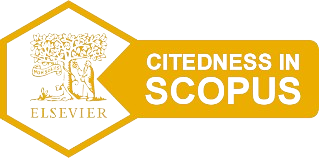Islamic Education’s Responses to Social Changes and Community Behaviors
DOI:
https://doi.org/10.15408/tjems.v7i1.16717Keywords:
social change, behavior, response, Islamic education, perubahan sosial, perilaku, respon, pendidikan IslamAbstract
Abstract
This study explains three things that are significant in the context of change. First, how is the change in community behavior as a result of the development of the oil palm plantation industry in the village of Dak Jaya, secondly why the people of the Dak Jaya village have changed their behavior in publishing Islamic education, third, what are the dimensions of the Islamic education development so that people have increased interest in Islamic education. The research approach is qualitative, data collection methods with interviews and direct observation, data validity techniques using triangulation of sources and extension of observation. Data were analysed from the beginning of data collection through an interactive process that is the collection, reduction, display, and verification or conclusion drawing. The results of the study explained that (1) changes in people’s attitudes as a result of economic changes opening up information openness present new values in people’s lives so that people change behavior into hedonists, pragmatics and individualists, (2) the impact of life towards hedonists, pragmatics and individualists in society make anxious about the future of the young generation so that it grows positive responses that make religious education as the construction of religious values and religious humanism, (3) madrassas and Islamic boarding schools are considered as the foremost oasis of the future because they can provide excellent service, develop creativity and provide ecological literacy for a healthy life.
Abstrak
Penelitian ini menjelaskan tiga hal yang signfikan dalam konteks perubahan. Pertama bagaimana perubahan perilaku masyarakat sebagai akibat dari perkembangan Industri perkebunan kelapa sawit di desa Dak Jaya, kedua mengapa masyarakat desa Dak Jaya berubah perilakunya dalammerepos pendidikan Agama Islam, ketiga, dimensi apa dari lembanga pendidikan Islam sehingga masyarakat meningkat minatnya terhadap pendidikan Islam. Pendekatan penelitian adalah kualitatif, metode pengumpulan data dengan wawancara dan observasi langsung, teknik keabsahan data menggunakan triangulasi sumber dan perpanjangan pengamatan. Data dianalisis sejak awal pengumpulan data melalui proses interaktif yakni pengumpulan, reduksi, display dan verifkasi atau penarikan kesimpulan. Hasil penelitian menjelaskan bahwa (1) perubahan sikap masyarakat akibat dari perubahan perekonomian membuka keterbukaan informas menghadirkan nilai-nila baru dalam kehidupan masyarakat sehingga mengubah perilaku masyarkat menjadi hedonis, pragmatis dan individualis, (2) dampak dari kehidupan kearah hedonis, pragmatis dan individualis pada masyarakat membuat rasa cemas terhadap masa depan generasi muda sehingga tumbuh respon positif yakni menjadikan pendidikan agama sebagai konstruksi nilai religiusitas dan humnisme religious, (3) madrasah dan pondok pesantren dinlai sebagai oasis menemuka masa depan karena mampu memberikan layanan prima, mengembangkan kreativitas dan memberikan literasi ekologis untuk hidup sehat.
How to Cite: Sukiono., Fauzan. (2020). Islamic Education’s Responses to Social Changes and Community Behaviors. TARBIYA: Journal of Education in Muslim Society, 7 (1), 29-47. doi:10.15408/tjems.v7i1.16717.
References
Bambang A. R. (2019). The Implementation of Multicultural Education and Extracuruluar Activities At Pesantren. TARBIYA: Journal of Education in Muslim Society, 23(3), 2019.
Brady, W. J., Wills, J. A., Jost, J. T., Tucker, J. A., Van Bavel, J. J., & Fiske, S. T. (2017). Emotion shapes the diffusion of moralised content in social networks. Proceedings of the National Academy of Sciences of the United States of America. https://doi.org/10.1073/pnas.1618923114
Centre, J. (2012). A Framework for character education in schools. In The Jubilee Centre for Character & Values.
Chawla, L., & Cushing, D. F. (2007). Education for strategic environmental behavior. Environmental Education Research. https://doi.org/10.1080/13504620701581539
Evrard, A. Y. (2017). Modernity at large: Cultural dimensions of globalisation. In Modernity at Large: Cultural Dimensions of Globalisation. https://doi.org/10.4324/9781912128990
Hashimov, E. (2015). Qualitative Data Analysis: A Methods Sourcebook and The Coding Manual for Qualitative Researchers. Technical Communication Quarterly. https://doi.org/10.1080/10572252.2015.975966
Hatu, R. (2011). perubahan sosial kultural masyarakat pedesaan (Suatu Tinjauan Teoritik-Empirik). Journal Inovasi.
Hoffmann, J. P. (2015). Religion: Morality and Social Control. In International Encyclopedia of the Social & Behavioral Sciences: Second Edition. https://doi.org/10.1016/B978-0-08-097086-8.84036-2
Johnstone, R. L. (2015). Religion in society: A sociology of religion. In Religion in Society: A Sociology of Religion. https://doi.org/10.4324/9781315662916
Mulyadi, M. (2015). Perubahan Sosial Masyarakat Agraris ke Masyarakat Industri dalam Pembangunan Masyarakat di Kecamatan Tamalate Kota Makassar. Jurnal Bina Praja. https://doi.org/10.21787/jbp.07.2015.311-321
Nasution, R. D. (2018). Pengaruh Modernisasi dan Globalisasi terhadap Perubahan Sosial Budaya di Indonesia. Jurnal Kominfo.
Norenzayan, A. (2014). Does religion make people moral? Behaviour. https://doi.org/10.1163/1568539X-00003139
Nurina Hakim, S., & Alyu Raj, A. (2017). Dampak kecanduan internet (internet addiction) pada remaja. Jurnal UNISSULA.
Proverawati, Atikah; Rahmawati, E. (2012). Perilaku Hidup Bersih dan Sehat (PHBS). Jurnal Keperawatan Komunitas. https://doi.org/978-602-202-076-9
Rais, N. S. R., Dien, M. M. J., & Dien, A. Y. (2018). Kemajuan teknologi informasi berdampak pada generalisasi unsur sosial budaya bagi generasi milenial. Jurnal Mozaik.
Ramseook-munhurrun, P., Lukea-bhiwajee, S. D., & Naidoo, P. (2010). Service quality in the public service. International Journal of Marketing and Marketing Research.
Reyes, V. (2018). Culture and globalisation. In Routledge Handbook of Cultural Sociology: Second Edition. https://doi.org/10.4324/9781315267784-58
Rosana, E. (2011). Modernisasi dan Perubahan Sosial. Jurnal TAPIs.
Scholz, R. W., Binder, C. R., Brand, F., Gallati, J., Lang, D. J., Bao Le, Q., Seidl, R., Smieszek, T., & Stauffacher, M. (2011). Environmental literacy in science and society: From knowledge to decisions. In Environmental Literacy in Science and Society: From Knowledge to Decisions. https://doi.org/10.1017/CBO9780511921520
Sohana, A. H. (2016). Pengaruh Media Massa Terhadap Perubahan Sosial Masyarakat. Jurnal of Social Sciences and Humanities.
Standard, B. (2014). The importance of excellent customer service. Most.
Syahza, A. (2004). Kelapa Sawit dan Kesejahteraan Petani di Pedesaan Daerah Riau. Perspektif.
Tidball, K. G., & Krasny, M. E. (2010). Urban Environmental Education from a Social-Ecological Perspective: Conceptual Framework for Civic Ecology Education. Cities and the Environment. https://doi.org/10.15365/cate.31112010
Triandis, H. C., & Gelfland, M. J. (2017). Individualism and collectivism scale Culture orientation scale. Global and Planetary Change. https://doi.org/10.1016/j.gloplacha.2017.08.018.











